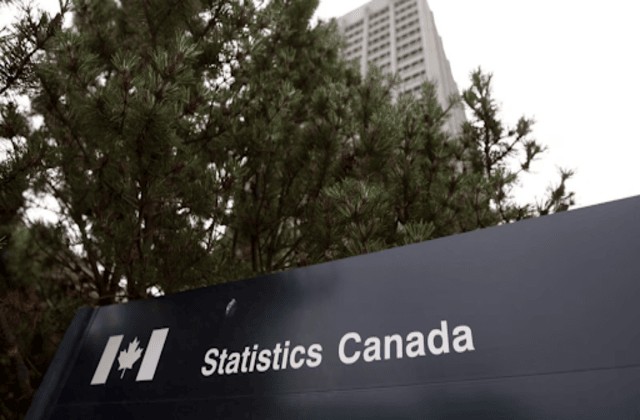
A sign identifies the Statistics Canada office in Ottawa on July 21, 2010. (The Canadian Press/Sean Kilpatrick)
The Canadian economy started 2025 with momentum but is now losing steam due to harsh winter conditions and the looming impact of U.S. tariffs.
Statistics Canada reported a 0.4% increase in real GDP for January, driven mainly by growth in oil, gas, and mining. However, February saw little to no growth, with the retail sector shrinking. Manufacturing, construction, and utilities showed modest gains, while service industries barely moved.
Economist Andrew DiCapua of the Canadian Chamber of Commerce warned that Canada is "sprinting into a wall," as recent growth may be short-lived. He noted that rising exports to the U.S. temporarily boosted the economy, but since these industries will be affected by tariffs, the benefits won’t last.
CIBC’s Andrew Grantham pointed to severe winter weather and the expiration of Ottawa’s sales tax holiday as key reasons for the February slowdown. He also suggested that the January boost was due to businesses increasing exports before U.S. tariffs took effect in March.
With tariffs expected to drag down GDP in the coming months, Bank of Canada surveys show a drop in business and consumer confidence. This lack of optimism may further weaken spending and investment, worsening the economic outlook beyond the tariffs themselves.
The trade conflict escalated in early March when U.S. President Donald Trump imposed broad tariffs on Canadian goods. A 25% tax on steel and aluminum followed on March 12, and more tariffs on foreign-made cars are set for April 2. Some Canadian-made vehicles could receive exemptions if they use mostly American parts, according to Ontario Premier Doug Ford.
Prime Minister Mark Carney acknowledged that Canada must rethink its economic strategy, saying the era of tight U.S.-Canada trade ties is over. While some industries may ramp up domestic manufacturing to counter trade losses, sectors like automotive face an uphill battle due to deep-rooted U.S. dependencies.
The Bank of Canada has already lowered interest rates by 25 basis points to 2.75% but faces tough choices ahead. Governor Tiff Macklem has stressed that balancing weak growth and inflation caused by tariffs will be difficult.
TD Bank economist Marc Ercolao cautioned that the ongoing trade war poses "clear downside risks" and said the central bank may need to cut rates further to support the economy. Financial markets currently predict a 65.6% chance of holding rates steady at the next decision on April 16.
However, if signs of a potential recession emerge, the Bank of Canada may have to make more aggressive rate cuts. Unless the U.S. reverses its tariff plans, Canada’s economy faces a rough road ahead.















